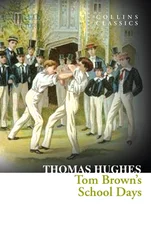Thomas Hughes - Tom Brown at Oxford
Здесь есть возможность читать онлайн «Thomas Hughes - Tom Brown at Oxford» — ознакомительный отрывок электронной книги совершенно бесплатно, а после прочтения отрывка купить полную версию. В некоторых случаях можно слушать аудио, скачать через торрент в формате fb2 и присутствует краткое содержание. Жанр: foreign_prose, foreign_language, на английском языке. Описание произведения, (предисловие) а так же отзывы посетителей доступны на портале библиотеки ЛибКат.
- Название:Tom Brown at Oxford
- Автор:
- Жанр:
- Год:неизвестен
- ISBN:нет данных
- Рейтинг книги:5 / 5. Голосов: 1
-
Избранное:Добавить в избранное
- Отзывы:
-
Ваша оценка:
- 100
- 1
- 2
- 3
- 4
- 5
Tom Brown at Oxford: краткое содержание, описание и аннотация
Предлагаем к чтению аннотацию, описание, краткое содержание или предисловие (зависит от того, что написал сам автор книги «Tom Brown at Oxford»). Если вы не нашли необходимую информацию о книге — напишите в комментариях, мы постараемся отыскать её.
Tom Brown at Oxford — читать онлайн ознакомительный отрывок
Ниже представлен текст книги, разбитый по страницам. Система сохранения места последней прочитанной страницы, позволяет с удобством читать онлайн бесплатно книгу «Tom Brown at Oxford», без необходимости каждый раз заново искать на чём Вы остановились. Поставьте закладку, и сможете в любой момент перейти на страницу, на которой закончили чтение.
Интервал:
Закладка:
Tom was punted across to Hall's in a state of great content, which increased when, in answer to his casual inquiry, the managing man informed him that not a man of his college was about the place. So he ordered a skiff with as much dignity and coolness as he could command, and hastened up stairs to dress. He appeared again, carrying his boating coat and cap. They were quite new, so he would not wear them; nothing about him should betray the freshman on this day if he could help it.
"Is my skiff ready?"
"All right, sir; this way, sir;" said the manager, conducting him to a good, safe-looking craft. "Any gentleman going to steer, sir?"
"No" said Tom, superciliously; "You may take out the rudder."
"Going quite alone, sir? Better take one of our boys – find you a very light one. Here, Bill!" – and he turned to summons a juvenile waterman to take charge of our hero.
"Take out the rudder, do you hear?" interrupted Tom. "I won't have a steerer."
"Well, sir, as you please," said the manager, proceeding to remove the degrading appendage. "The river's rather high, please to remember, sir. You must mind the mill stream at Iffley Lock. I suppose you can swim?"
"Yes, of course," said Tom, settling himself on his cushion.
"Now, shove her off."
The next moment he was well out in the stream, and left to his own resources. He got his sculls out successfully enough, and, though feeling by no means easy on his seat, proceeded to pull very deliberately past the barges, stopping his sculls in the air to feather accurately, in the hopes of deceiving spectators into the belief that he was an old hand just going out for a gentle paddle. The manager watched him for a minute, and turned to his work with an aspiration that he might not come to grief.
But no thought of grief was on Tom's mind as he dropped gently down, impatient for the time when he should pass the mouth of the Cherwell, and so, having no longer critical eyes to fear, might put out his whole strength, and give himself at least if not the world, assurance of a waterman.
The day was a very fine one, a bright sun shining, and a nice fresh breeze blowing across the stream, but not enough to ruffle the water seriously. Some heavy storms up Gloucestershire way had cleared the air, and swollen the stream at the same time; in fact, the river was as full as it could be without overflowing its banks – a state in which, of all others, it is the least safe for boating experiments. Fortunately, in those days there were no outriggers. Even the racing skiffs were comparatively safe craft, and would now be characterized as tubs; while the real tubs (in one of the safest of which the prudent manager had embarked our hero) were of such build that it required considerable ingenuity actually to upset them.
If any ordinary amount of bungling could have done it, Tom's voyage would have terminated within a hundred yards of the Cherwell. While he had been sitting quiet and merely paddling, and almost letting the stream carry him down, the boat had trimmed well enough; but now, taking a long breath, he leaned forward, and dug his sculls into the water, pulling them through with all his strength. The consequence of this feat was that the handles of the sculls came into violent collision in the middle of the boat, the knuckles of his right hand were barked, his left scull unshipped, and the head of his skiff almost blown round by the wind before he could restore order on board.
"Never mind; try again," thought be, after the first sensation of disgust had passed off, and a glance at the shore showed him that there were no witnesses. "Of course, I forgot one hand must go over the other. It might have happened to anyone. Let me see, which hand shall I keep uppermost; the left, that's the weakest." And away he went again, keeping his newly-acquired fact painfully in mind, and so avoiding further collision amidships for four or five strokes. But, as in other sciences, the giving of undue prominence to one fact brings others inexorably on the head of the student to avenge his neglect of them, so it happened with Tom in his practical study of the science of rowing that by thinking of his hands he forgot his seat, and the necessity of trimming properly. Whereupon the old tub began to rock fearfully, and the next moment, he missed the water altogether with his right scull, and subsided backwards, not without struggles, into the bottom of the boat; while the half stroke which he had pulled with his left hand sent her head well into the bank.
Tom picked himself up, and settled himself on his bench again, a sadder and wiser man, as the truth began to dawn upon him that pulling, especially sculling, does not, like reading and writing, come by nature. However, he addressed himself manfully to his task; savage indeed, and longing to drive a hole in the bottom of the old tub, but as resolved as ever to get to Sandford and back before hall time, or perish in the attempt.
He shoved himself off the bank, and warned by his last mishap, got out into mid stream, and there, moderating his ardor, and contenting himself with a slow and steady stroke, was progressing satisfactorily, and beginning to recover his temper, when a loud shout startled him; and, looking over his shoulder at the imminent risk of an upset, he beheld the fast sailor the Dart, close hauled on a wind, and almost aboard of him. Utterly ignorant of what was the right thing to do, he held on his course, and passed close under the bows of the miniature cutter, the steersman having jammed his helm hard down, shaking her in the wind, to prevent running over the skiff, and solacing himself with pouring maledictions on Tom and his craft, in which the man who had hold of the sheets, and the third, who was lounging in the bows, heartily joined. Tom was out of ear-shot before he had collected vituperation enough to hurl back at them, and was, moreover, already in the difficult navigation of the Gut, where, notwithstanding all his efforts, he again ran aground; but, with this exception, he arrived without other mishap at Iffley, where he lay on his sculls with much satisfaction, and shouted, "Lock – lock!"
The lock-keeper appeared to the summons, but instead of opening the gates seized a long boat-hook, and rushed towards our hero, calling upon him to mind the mill-stream, and pull his right-hand scull; notwithstanding which warning, Tom was within an ace of drifting past the entrance to the lock, in which case assuredly his boat, if not he, had never returned whole. However, the lock-keeper managed to catch the stern of his skiff with the boat-hook, and drag him back into the proper channel, and then opened the lock-gates for him. Tom congratulated himself as he entered the lock that there were no other boats going through with him; but his evil star was in the ascendant, and all things, animate and inanimate, seemed to be leagued together to humiliate him. As the water began to fall rapidly, he lost his hold of the chain and the tub instantly drifted across the lock, and was in imminent danger of sticking and breaking her back, when the lock-keeper again came to the rescue with his boat-hook and, guessing the state of the case, did not quit him until he had safely shoved him and his boat well out into the pool below, with an exhortation to mind and go outside of the barge which was coming up.
Tom started on the latter half of his outward voyage with the sort of look which Cato must have worn when he elected the losing side, and all the gods went over to the winning one. But his previous struggles had not been thrown away, and he managed to keep the right side of the barge, turn the corner without going around, and zigzag down Kennington reach, slowly indeed, but with much labor, but at any rate safely. Rejoicing in his feat, he stopped at the island, and recreated himself with a glass of beer, looking now hopefully towards Sandford, which lay within easy distance, now upwards again along the reach which he had just overcome, and solacing himself with the remembrance of a dictum, which he had heard from a great authority, that it was always easier to steer up stream than down, from which he argued that the worst part of his trial trip was now over.
Читать дальшеИнтервал:
Закладка:
Похожие книги на «Tom Brown at Oxford»
Представляем Вашему вниманию похожие книги на «Tom Brown at Oxford» списком для выбора. Мы отобрали схожую по названию и смыслу литературу в надежде предоставить читателям больше вариантов отыскать новые, интересные, ещё непрочитанные произведения.
Обсуждение, отзывы о книге «Tom Brown at Oxford» и просто собственные мнения читателей. Оставьте ваши комментарии, напишите, что Вы думаете о произведении, его смысле или главных героях. Укажите что конкретно понравилось, а что нет, и почему Вы так считаете.












